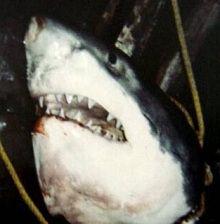New research shows white sharks have a larger appetite than originally thought
News Release
University of Tasmania, Australia ( UTAS )
19. March 2013
——————-
 Study challenges popular assumptions about feeding behaviour of the ocean’s top predator
Study challenges popular assumptions about feeding behaviour of the ocean’s top predator
A ground-breaking new study challenges popular assumptions about the feeding behaviour of the world’s largest predatory fish, the white shark.
The research, which has been published in the prestigious journal Scientific Reports, suggests that white sharks may have much higher energy needs than previously thought.
The study was conceived by Dr Jayson Semmens of the University of Tasmania’s Institute for Marine and Antarctic Studies (IMAS), along with collaborators at the University of New South Wales, South Australian Research and Development Institute/Flinders University, The Marine Biological Association of the UK/University of Southampton and CSIRO.
White sharks are the ocean’s top predators and their natural range extends across the globe. However, like many marine predators, they are notoriously difficult to study.
“The energy requirements of large sharks in the wild are poorly documented and their prey intake rates are largely unknown,” Dr Semmens said. “Research on how sharks interact with their ecosystems is needed because many shark species are highly vulnerable to overexploitation.
“Our study uses metabolic rates derived from swimming speed estimates to suggest that feeding requirements of the white shark are much higher than previously proposed,” he said.
The only prior study of shark energy requirements had suggested that a large (one-tonne) white shark could survive on a 30kg meal for around one and a half months.
However, the new research indicates that such a meal would in fact only provide energy for between 12 and 15 days – three to four times less than previously suggested.
Quantifying the energy requirements of animals in their natural habitat, particularly apex predators such as sharks, is critical for a balanced understanding of ecosystem ecology and the physiology and behaviour of species.
Innovative research approaches, such as those used in Dr Semmens’ study, may help to answer key ecological questions for a species whose population status is poorly known. This information is key to understanding the role that top-order predators such as white sharks play in marine ecosystems.
Dr Semmens would like to thank and acknowledge his co-authors Dr Nicholas Payne, Dr Charlie Huveneers, Professor David Sims and Mr Barry Bruce.
Source: UTAS
Related Scientific Study:
J. M. Semmens, N. L. Payne, C. Huveneers, D. W. Sims & B. D. Bruce
Feeding requirements of white sharks may be higher than originally thought
Scientific Reports 3, Article number: 1471, doi:10.1038/srep01471
————–
